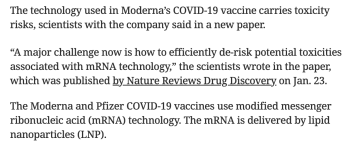Oh sh*t.
The peer-reviewed study, published in the Cureus journal on Jan. 24, analyzed reports from the initial phase 3 trials of Pfizer and Moderna COVID-19 mRNA vaccines...The study also looked into several other research and reviews of the trials. It found that the vaccines had “dramatically lower” efficacy rates than the vaccine companies claimed.
Moreover, based on “conservative assumptions, the estimated harms of the COVID-19 mRNA vaccines greatly outweigh the rewards: for every life saved, there were nearly 14 times more deaths caused by the modified mRNA injections.”
“Given the well-documented SAEs (serious adverse events) and unacceptable harm-to-reward ratio, we urge governments to endorse and enforce a global moratorium on these modified mRNA products until all relevant questions pertaining to causality, residual DNA, and aberrant protein production are answered.”
The authors also recommended an “immediate removal” of the COVID-19 vaccines from the childhood immunization schedule. They pointed out that children were at very low risk from the infection.
“It is unethical and unconscionable to administer an experimental vaccine to a child who has a near-zero risk of dying from COVID-19 but a well-established 2.2 percent risk of permanent heart damage based on the best prospective data available.”
Following the first trials of Pfizer and Moderna, it was claimed that mRNA COVID-19 vaccines had a 95 percent reduction of symptomatic COVID-19. The study pointed out that this efficacy assumption was false.
“There were 1,594 such cases in the vaccinated group and 1,816 in the placebo. When factoring in both confirmed and suspected cases, vaccine efficacy against developing symptoms drops to only 19 percent, far below the 50 percent RR (relative risk) reduction threshold required for regulatory authorization,” the study said.
“Thus, when considering both confirmed and suspected cases, vaccine efficacy appears to have been dramatically lower than the official 95 percent claim.”
Researchers criticized the Pfizer and Moderna trial reports for “exclusive focus” on relative risk or RR measure while omitting absolute risk reduction. They argued that absolute risk reduction “gives a better indication of a drug’s clinical utility.”
“Both types of risk estimation are required to avoid reporting bias and to provide a more comprehensive perspective on vaccine efficacy. Omitting the absolute risk statistics leads to overestimation of the clinical benefits of the vaccines.”
“An absolute risk reduction of approximately 1 percent for the COVID-19 mRNA vaccinations meant that a substantial number of individuals would need to be injected in order to prevent a single mild-to-moderate case of COVID-19.”
To prevent one case of COVID-19 infection, 142 individuals would need to be vaccinated with Pfizer’s shot, the study said. When it came to Moderna, 88 people had to be injected.
Taking into account these numbers as well as the infection fatality rates of COVID-19, the researchers concluded that roughly 52,000 people would need to be vaccinated to prevent one COVID-19-related death.
This would mean two lives saved for roughly 100,000 injections of the Pfizer vaccine. However, there is a risk of 27 deaths per 100,000 doses of Pfizer shot, the researchers calculated.
mRNA COVID-19 Vaccines Caused More Deaths Than Saved: Study
Researchers called for a ‘global moratorium’ as the study revealed ‘well-documented’ serious adverse events and an unacceptable harm-to-reward ratio.The peer-reviewed study, published in the Cureus journal on Jan. 24, analyzed reports from the initial phase 3 trials of Pfizer and Moderna COVID-19 mRNA vaccines...The study also looked into several other research and reviews of the trials. It found that the vaccines had “dramatically lower” efficacy rates than the vaccine companies claimed.
Moreover, based on “conservative assumptions, the estimated harms of the COVID-19 mRNA vaccines greatly outweigh the rewards: for every life saved, there were nearly 14 times more deaths caused by the modified mRNA injections.”
“Given the well-documented SAEs (serious adverse events) and unacceptable harm-to-reward ratio, we urge governments to endorse and enforce a global moratorium on these modified mRNA products until all relevant questions pertaining to causality, residual DNA, and aberrant protein production are answered.”
The authors also recommended an “immediate removal” of the COVID-19 vaccines from the childhood immunization schedule. They pointed out that children were at very low risk from the infection.
“It is unethical and unconscionable to administer an experimental vaccine to a child who has a near-zero risk of dying from COVID-19 but a well-established 2.2 percent risk of permanent heart damage based on the best prospective data available.”
Following the first trials of Pfizer and Moderna, it was claimed that mRNA COVID-19 vaccines had a 95 percent reduction of symptomatic COVID-19. The study pointed out that this efficacy assumption was false.
“There were 1,594 such cases in the vaccinated group and 1,816 in the placebo. When factoring in both confirmed and suspected cases, vaccine efficacy against developing symptoms drops to only 19 percent, far below the 50 percent RR (relative risk) reduction threshold required for regulatory authorization,” the study said.
“Thus, when considering both confirmed and suspected cases, vaccine efficacy appears to have been dramatically lower than the official 95 percent claim.”
Researchers criticized the Pfizer and Moderna trial reports for “exclusive focus” on relative risk or RR measure while omitting absolute risk reduction. They argued that absolute risk reduction “gives a better indication of a drug’s clinical utility.”
“Both types of risk estimation are required to avoid reporting bias and to provide a more comprehensive perspective on vaccine efficacy. Omitting the absolute risk statistics leads to overestimation of the clinical benefits of the vaccines.”
“An absolute risk reduction of approximately 1 percent for the COVID-19 mRNA vaccinations meant that a substantial number of individuals would need to be injected in order to prevent a single mild-to-moderate case of COVID-19.”
To prevent one case of COVID-19 infection, 142 individuals would need to be vaccinated with Pfizer’s shot, the study said. When it came to Moderna, 88 people had to be injected.
Taking into account these numbers as well as the infection fatality rates of COVID-19, the researchers concluded that roughly 52,000 people would need to be vaccinated to prevent one COVID-19-related death.
This would mean two lives saved for roughly 100,000 injections of the Pfizer vaccine. However, there is a risk of 27 deaths per 100,000 doses of Pfizer shot, the researchers calculated.
Researchers cited a September 2022 analysis to detail the pervasiveness of serious adverse effects (SAE) among the vaccinated group in the trials. The analysis looked at both Pfizer and Moderna trial data, discovering roughly 125 SAEs per 100,000 vaccine recipients. This indicated one SAE per 800 vaccines.
“The Pfizer trial exhibited a 36 percent higher risk of serious adverse events in the vaccine group (compared to placebo) … The Moderna trial exhibited a 6 percent higher risk of serious adverse events in the vaccine group,” the analysis stated.
“These findings stand in sharp contrast with the FDA’s initial claim that SAEs reported by the two pivotal trials were ‘balanced between treatment groups,’” researchers from the Jan. 24 study noted.
This discrepancy could be because the FDA only counted the number of individuals with serious adverse events rather than the total SAEs experienced by the trial subjects, they said.



